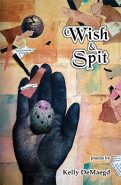
Book Review: Wish & Spit by Kelly DeMaegd
Reviewed by Nancy Posey

Wish & Spit
Poems by Kelly DeMaegd
Main Street Rag, February 2017
$14.00; 60 pp.
ISBN-13: 978-1-59948-616-1
Kelly DeMaegd’s poem “Assonance” delivers the recurring reply from which she derives the title of her debut poetry collection:
You can wish in one hand, spit
in the other, see which one fills
up first . . .
This collection, particularly the first section entitled “First Light,” is enlivened by the speaker’s mother, who repeats this advice. Readers are warned by the epigraph from John Cheever, “I lie in order to tell a more significant truth,” against mistaking truth for facts, a common error when reading poetry as well as prose. Through these poignant poems, the speaker introduces her mother, a fragile, perhaps even broken woman who, in “Proper Names,” “required protection,” and her father who, in “This Might Explain It,” “saw the cracks, / married her anyway.” She describes with a keen eye for detail the time and place of her childhood, gaining wisdom in part by observing her own family life and perhaps even more by escaping to books, “school[ing her]self / in the art of caring for a family, she confesses in “Each Season Has Its Work,” from the pages of Little House in the Big Woods.
Rather than painting a picture of the dark side of childhood in a home where the mother is often away at the state hospital, DeMaegd shows a young girl who recognizes the gentleness in her father’s callused hands. She marries a man like her father, the “kind of man” she celebrates in “Ask No More”: one who “attends to the morning chores . . . gentle whispers to the dog . . . ” giving her the kind of “house / of burnished wood, polished glass” she had dreamed about, the kind of man she “wanted to love.”
Without sentimentality, the speaker describes her world, with attention to a cardinal feather discovered in a windblown bird’s nest, to the mimicry of a heron after a storm, or to, in “Late Summer,” “bees worry[ing] muscadines in to jelly.”
The speaker carries readers along, whether the ride is in the “’65 VW van” in “Only One Thing to Do,” listening to Dylan and Joni, “wishing [she] was Janis Joplin” or in “Ron Connen’s shit-brown / hunting camp car” listening to Zeppelin in “Nothing Like It.” DeMaegd’s poems seem to have a soundtrack playing in the background on the “Bakelite Philco tube radio” that takes readers back in time with the speaker.
Even the dogs in the poems are embodied with more meaning than ordinary pets. In “Only Way Out,” the speaker confesses that her “mother resembled our dog. / Both possessed a longing / incapable of being satisfied . . . ” In “Lesson,” as the terrier bounces in and out of view at the kitchen window as the family eats, she was “advised to study that dog.”
Whether in poems appearing as dreams or those recorded as memory, DeMaegd builds the story of a survivor, a daughter, wife, and sister who learns from life and finds joy in the details.
Nancy Posey lives in Brentwood, TN, where she is an adjunct English professor after retiring from full-time teaching in North Carolina. An avid reader, she participates in two book clubs and blogs about books at discriminatingreader.com. She also writes poetry, plays the mandolin, and always enjoys learning something new.

Fantastic and spot-on review of a fabulous first-time book of poetry by a wonderful poet, collegiate and person.